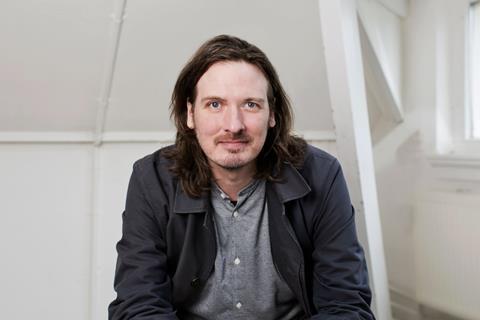
This year’s IDFA DocLab, the festival’s section that showcases completed interactive documentary and emerging media, is organised around the theme of ‘Phenomenal Friction’.
As DocLab founder Caspar Sonnen explains, friction doesn’t have to be a bad thing. The trick is not to look at it from the point of view of “conflict” and “negative interactions.” Instead, he wants festivalgoers to enjoy the creative possibilities unleashed when you ”throw sand” into the machine.
“There was a moment when I was in my local supermarket,” he explains. “It was one of the first with self -checkout registers. The whole idea is that it is removing friction.”
He realised supermarket customers were just as irritated as they had been with the old tills. “They’re waiting just as much as they used to but now they are just waiting for people before them. Now they are annoyed at the person in front of them not checking out fast enough.” The supermarket used to be a place where shoppers interacted with strangers and where young people often got their first jobs. The new tills put paid to that.
“We started thinking about this within the team. Asking, ‘what is friction?’ and ‘what are the consequences of removing friction and making things smooth and easier?’ Making things smooth so you don’t interact anymore, starts to lead to other forms of friction.”
This was the central paradox - that removing friction breeds new friction.
“In the world of interactive and immersive art, you can see that the lack of friction in a digital art world is a problem as there are not enough points of interaction in a digital art world,” he suggests.
DocLab is trying to rise to the challenge of presenting “ephemeral, weightless digital experiences” to a physical audience at a festival.
“At its more core level, this is what a festival is, a place to interact, to meet, to discover new people…to go beyond Zoom calls and efficiency and have 10 days disconnected from everyday life in this pressure cooker where we all meet, interact. And have these moments of friction,” Sonnen notes.
DocLab is “an interdisciplinary programme open to anything and everything.” Sonnen and his team have no formal requirements as to what they can programme. Nonetheless, they found that almost every project submitted was dealing with friction in one form or another.
This is the first DocLab since ChatGPT was launched late last year. “Five years ago, when we started our R&D programme, one of the research questions was ‘what is the relationship between authorship and Artificial Intelligence?’ Back then, the response was, ‘it is still mostly manual labour with a few old algorithms’ because AI wasn’t as accessible as artists. Now, there is a huge democratisation around AI. Everybody can play with it,” Sonnen observes. “We could see a lot of work being made [with AI],”
One of the AI-related interactive projects IDFA commissioned as part of the DocLab interactive film grant is This Conversation Is Off The Record, an interactive project by Nirit Peled. This follows her film Mothers, which screened at IDFA last year. It looks at risk-based profiling by Amsterdam police through which they target migrant young people. They may not have committed any crimes yet but the algorithms suggest they might do so in future.
“It’s a heart-breaking story of seeing what happens when police officials and behaviour scientists, people who are trying to prevent somebody from going into a career of crime, are there early,” says Sonnen. “However, instead of doing that by interacting with people, [they are doing that] through a cold computer…targeting kids and branding them as on the way to being a criminal.”
DocLab is also screening Godfrey Reggio’s 1982 classic Koyaanisqatsi, famous for its Philip Glass music and imagery of frenzied urban life. Also screening is John Fitzgerald’s The Vivid Unknown which explores what happens when Koyaanisqatsi is fed into an AI system.
William Quail’s Pyramid, a new project from Piotr Winiewicz and Constant Dullaart, asks whether Artificial Intelligence will ever be capable of creating real art. This was commissioned in response to a Werner Herzog remark that AI could never made a film as good as one of his own. In the video installation, an AI system is fed the linguistic elements of Akkadian, a language from the time of the mythical Tower of Babel, and uses it to create its own language, what Sonnen calls “artificial gibberish.”
Several works in DocLab this year have a contemporary political resonance. Sonnen says he and his team have seen a “huge increase” in the number of projects received from Asia, Africa and Latin America this year. Among the titles in the programme is Going Back Home: Mother VR from Chilean director Catalina Alarcón. This explores how VR is being used to allow women locked up in Chilean prisons to stay in “virtual touch” with their loved ones.
“They use VR technology to create immersive messages to the incarcerated women. It shows how beautiful technology can also be. Technology can bring us together and connect us,” Sonnen says of an interactive project which is helping mitigate the cruelty of the Chilean penal system.
Meanwhile, another interactive world premiere, Offset: Boiler Room from US filmmakers Sam Lavigne, and Tega Brain challenges viewers to question their own role in climate change.
“It’s quite a thought provoking experience which creates a dashboard that allows you to place a phone call to an executive from an oil company or some of the most polluting companies in the world. You can try to get them directly on the phone to have a conversation with them, either to waste their time or to try to sell them a carbon offset…”















![[L-R]: Amanda Villavieja, Laia Casanovas, Yasmina Praderas](https://d1nslcd7m2225b.cloudfront.net/Pictures/274x183/6/4/1/1471641_pxl_20251224_103354743_618426_crop.jpg)








![[L-R]: Amanda Villavieja, Laia Casanovas, Yasmina Praderas](https://d1nslcd7m2225b.cloudfront.net/Pictures/100x67/6/4/1/1471641_pxl_20251224_103354743_618426_crop.jpg)
No comments yet